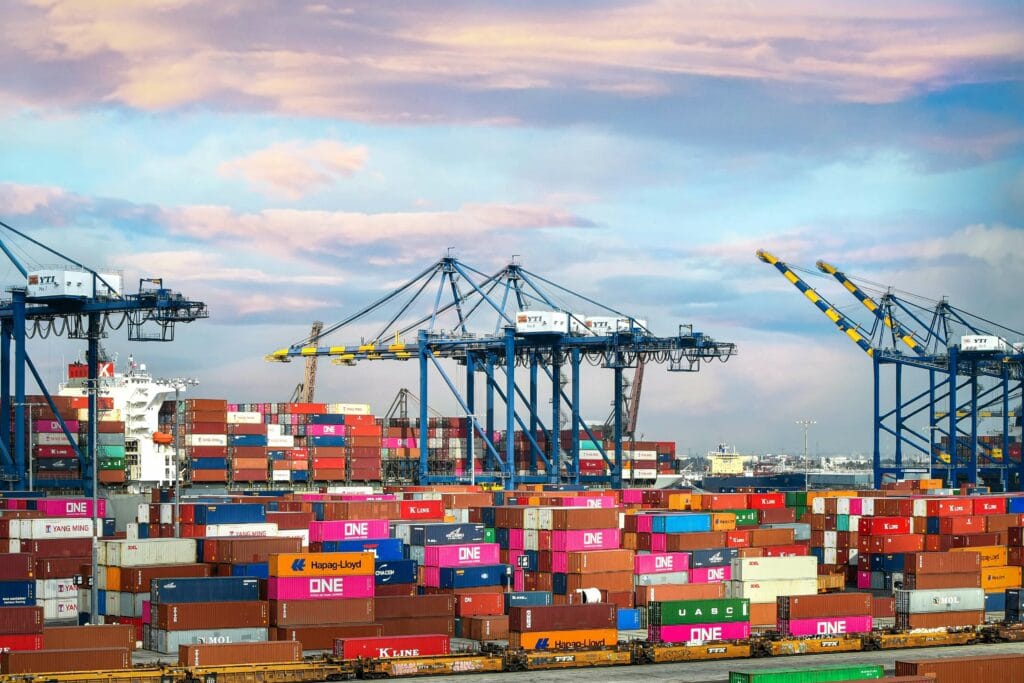Welcome to the AI Revolution in eCommerce
Ever wondered how artificial intelligence is altering the eCommerce landscape? In the latest episode of The Checkout Point by Blikket.co, we dive into how AI is not just a technological tool but a transformative force reshaping the entire industry. Imagine a scenario where handling customer inquiries, managing inventory, and personalizing shopping experiences are all streamlined by AI. This isn’t a glimpse into a distant future—it’s happening right now, revolutionizing efficiency but also introducing new challenges, particularly around privacy and ethics.

The Impact of AI on eCommerce Efficiency
- Customer Service Automation: AI-powered chatbots and virtual assistants are taking over routine customer service tasks, offering quick responses and freeing up human agents for more complex issues.
- Inventory Management: AI algorithms predict purchasing trends and automate restocking, minimizing overstock and outages.
- Personalized Shopping: From product recommendations to personalized marketing, AI tailors the shopping experience to each customer’s preferences and behaviors.

Addressing the Challenges
However, integrating AI into eCommerce isn’t without its hurdles. Concerns about data privacy and the ethical use of AI are becoming increasingly prominent. As we harness these advanced technologies, deep contemplations on their implications and responsible use are imperative. How do we balance innovation with integrity? That’s a question we’ll explore further in today’s discussion.
Join us as we unravel these topics and more, providing you with keen insights and actionable strategies to navigate the complex yet exhilarating realm of eCommerce powered by artificial intelligence.

Artificial Intelligence Reshapes eCommerce Operations
In the realm of digital commerce, artificial intelligence in eCommerce is no longer just an advanced technology on the peripherals—it’s the engine driving revolutionary changes. The convenience and efficiency it introduces are transforming traditional operations into responsive, predictive powerhouses. Let’s delve deeper into how AI is reshaping the backbone of the eCommerce industry.

Revolutionizing Supply Chains and Inventory Management
The integration of AI into eCommerce supply chains is dramatically enhancing operational efficiencies. By utilizing predictive analytics, AI technologies forecast demand trends with remarkable accuracy. This not only aids in maintaining optimal inventory levels but also minimizes waste and reduces carrying costs. Think of it as having a futuristic crystal ball that informs you what, when, and how much your customers will purchase.
Moreover, AI-driven systems facilitate real-time decision-making. This agility is critical especially in scenarios where quick adjustments are needed, potentially saving thousands of dollars through dynamic logistics and inventory management. The outcome? Faster order fulfillments and a markedly improved shopping experience that keeps consumers coming back.
AI in Personalization and Consumer Engagement
Personalization has shifted from being a marketing tactic to a fundamental component of modern eCommerce experiences. AI excels in creating personalized shopping experiences by analyzing numerous data points—such as previous purchases, browsing history, and consumer preferences. This enables eCommerce platforms to not only target products more effectively but also to tailor suggestions that cater to individual needs.
This level of customization enhances consumer engagement, boosting both sales and customer satisfaction rates. In fact, it’s like having a personal shopper for each consumer, but one that’s algorithmically optimized to suggest items you’re likely to purchase, sometimes, before you even realize you need them.
Optimizing Search with AI
Every eCommerce owner knows the power of a streamlined, efficient search capability within their platforms. With the advancements highlighted in AI’s overhaul of search engine algorithms, the results now are not only about relevance but about predicting what a user might be interested in next. This proactive approach in delivering search results can make browsing less of a chore and more of a pleasantly surprising journey.
This optimization goes beyond simple keyword matching. AI can interpret user intent, context, and semantics of their search queries, making results more intuitive and tailored. It’s like having a conversation with your search engine that understands you better than you understand yourself!
Embracing AI in eCommerce with a Critical Eye
As we continue to navigate through the vast potentials of artificial intelligence in eCommerce, the importance of approaching its adoption mindfully cannot be overstated. While AI can usher in unprecedented growth and possibilities, addressing the ethical implications, privacy concerns, and the shifting dynamics in employment it creates is crucial. Engaging with AI technologies responsibly ensures that we can benefit from its capabilities without compromising our values or societal welfare.
Understanding the nuances and transformative potential of AI in eCommerce, from supply chain logistics to customer interactions, is key to not just surviving but thriving in this digital era. As we explore this brave new world of AI-driven solutions, let’s continue to question, learn, and wisely integrate these technologies into our strategies.

Understanding Tariffs: The Fine Line Between Protection and Provocation
In the dynamic realm of international trade, the role of tariffs extends far beyond mere fiscal measures; they are strategic tools that can significantly alter economic landscapes. Positioned as economic safeguards, these tariffs serve to protect domestic industries by making imported goods more costly. The rationale is straightforward—boost local business competitiveness. However, the cascading effects they generate often unfold in ways that are anything but predictable.
A striking example of this is the targeted tariffs on Chinese online retailers like Temu and Shein. Previously, these companies leveraged a loophole in trade regulations to dodge traditional taxes, enabling them to sell goods at exceptionally low prices. The imposition of specific tariffs intended to eradicate this loophole, ostensibly a boon for U.S. businesses, brings to the forefront a slew of challenges, primarily how domestic consumers react to the increase in prices and the repercussions on international trade relations.

Global Reactions to Domestic Decisions
The impact of tariffs isn’t confined within a single nation’s borders; it provokes global responses that can escalate into widespread economic skirmishes. Take, for example, the aftermath in Ontario post the tariff adjustments. In a direct response, Ontario made the decisive move to pull U.S. alcohol products off its shelves, a stark illustration of how trade measures can ripple outwards, affecting sectors not originally targeted by the initial tariffs.
The broader ramifications were felt even stronger when extended to North America’s major trade partners, Canada and Mexico. Tariffs imposed on these neighbors brought an additional layer of complexity to the already intricate North American trade relationships, as detailed in a report by Retail Dive. These regions share deeply intertwined economic ties and supply chains, making any disruption a potential threat to various facets of commerce and industry.
The Delicate Balance of International Economic Policy
The strategic use of tariffs, while intentioned to protect domestic enterprises, requires a delicate balancing act. It’s not just about safeguarding local jobs and industries but also about maintaining healthy international relations and stable global markets. The real challenge for policymakers lies in deploying tariffs in a manner that revises trade in favor of national interests without igniting retaliatory measures that could lead to broader economic fallouts.
The discussions surrounding tariffs in international trade underscore the complexity of our global interconnectedness. The decisions of one nation can have far-reaching consequences, affecting global economic relations and the daily lives of people around the world.
As the discussion on tariffs unfolds, the essential question remains—how do we craft economic policies that promote fair trade yet prevent adverse repercussions? This is not just a policy dilemma but a pressing global inquiry that calls for thoughtful strategies in the face of burgeoning international challenges.
In conclusion, while the protectionist intent behind tariffs is clear, the broader economic narrative demands a nuanced approach that weighs both domestic gains and international consequences. Striking this balance continues to be an intricate dance of diplomacy and economic strategy.
Exploring the Impact of Global Decisions on Bitcoin’s Surge
Imagine waking up to find that Bitcoin’s value has soared to an astonishing $99,000. Surprising as it may seem, this spike was influenced by a seemingly unrelated event: the U.S. government’s decision to delay tariffs on Mexico. Such a development reveals the intricate ways in which global politics and financial markets are connected, even extending to the realm of cryptocurrencies like Bitcoin. For an in-depth understanding, consider this recent CNBC article that discusses the specifics of this phenomenon.

The Role of Stability and Investor Confidence in Cryptocurrency Prices
When discussing why a delay in tariffs can affect cryptocurrency prices, it’s crucial to acknowledge the role of stability and investor sentiment. Tariffs are essentially taxes on imported goods and services—imposing them can mean economic turbulence, while delaying them suggests a stable, promising economic outlook. Investors generally prefer stable conditions, often turning to what they perceive as safe investments during uncertain times. This shift in sentiment is likely what drove Bitcoin’s value up, as detailed in the linked CNBC report above. Such dynamics spotlight how Bitcoin is not merely an alternative investment but a key player in global economic strategies.

Regulatory Achievements: Coinbase’s UK Milestone
On the regulatory front, significant progress in cryptocurrency acceptance is evident from Coinbase’s recent approval as a registered crypto firm in the UK. This approval marks it as the largest firm of its type in the region, a testament to its compliance and reliability in the eyes of regulators. More on this can be found in a detailed article from PYMNTS.com. Such milestones are not just ceremonial but signal a broader acceptance and integration of cryptocurrencies within traditional financial systems, enhancing user trust and expanding the market base.

Tesla’s Profitable Dive into Bitcoin Investment
The impact of regulatory changes on corporate strategies can also be seen in Tesla’s recent financial disclosures. The electric car pioneer reported a staggering $600 million profit from its Bitcoin investments, following amendments in digital asset regulations. This news, covered extensively by CNBC, highlights how corporations are increasingly viewing digital currencies as viable components of their financial strategy. Tesla’s success story exemplifies the growing corporate faith in Bitcoin’s potential as a standard asset class.

What This Means for the Future of Cryptocurrencies
For investors, whether seasoned or new to the scene, these developments provide valuable insights into the integration of cryptocurrency with traditional financial sectors. They also underscore the critical role of regulatory frameworks in shaping the market landscape. As we track these changes, they offer not just financial investment opportunities but also a lens through which we can view the evolving narratives of global economics and digital finance.
The interplay between technology, regulatory decisions, and market dynamics emphasizes the complex yet exciting future of cryptocurrencies. Each update in this sector is not just about the immediate financial implications but also about the broader potential and challenges in the digitalization of our economic systems.
As we continue to witness the evolution of these financial tools, the ongoing developments in the cryptocurrency market are bound to keep enthusiasts, investors, and analysts on the edge of their seats, anticipating the next big shift in the digital finance landscape.

Artificial Intelligence in Ecommerce: Revolutionizing Online Market Dynamics
In the ever-evolving sphere of ecommerce, technological advancements are not just enhancing the way we conduct business—they are completely reshaping the landscape. On January 30, 2025, the ecommerce world witnessed the unveiling of groundbreaking tools that promise to streamline online selling and elevate the shopping experience. Central to this transformation is the integration of artificial intelligence (AI) in ecommerce, a shift that both challenges traditional business models and offers unprecedented opportunities for growth.

Revamping Customer Interactions with AI Technology
One of the most noteworthy advancements disclosed was the implementation of AI-driven customer service robots. These aren’t your average chatbots; these virtual assistants cater to customers with a level of empathy and precision previously unseen in automated systems. By analyzing customer data and behavior, AI in ecommerce platforms can now predict purchasing trends and personalize service to an individual’s preferences and past interactions.
Such tools reflect a profound knowledge of the modern market’s demands and tailor solutions accordingly. This deep dive into AI usage allows businesses to not only meet customer expectations but exceed them, fostering a relationship that extends beyond a mere transaction. For more insights, explore the feature on “New Ecommerce Tools launched this year.
Navigating New Logistics Strategies
In another major turn of events, revered logistics giant UPS is restructuring its business model with Amazon. By reducing its Amazon operations by over 50%, as reported by Retail Dive, UPS is not just altering its own strategy but also encouraging other players in the market to rethink their logistic frameworks. This bold move could potentially lower direct dependency on major carriers and stimulate the rise of innovative, cost-effective shipping methods that benefit both sellers and consumers alike.
Enhancing Market Security and Confidence
On the security front, Amazon is tightening regulations to ensure safer transactions within its marketplace. The recent update requiring sellers to verify their emergency contact numbers is a leap towards greater accountability. This measure not only protects the platform but also secures the sellers and buyers from potential disruptions. More details on this development can be viewed on EcommerceBytes.
Each of these developments contributes to a broader narrative where AI and strategic decisions heavily influence the ebb and flow of ecommerce. This is not just about adopting new technologies but integrating them in such a way that they redefine market operations and user interactions. As ecommerce entities and tools become more refined and sophisticated, they create a dynamic ecosystem where business efficiency is as much about innovation as it is about implementation.
Next time you engage in the digital marketplace, whether hitting the “Buy Now” button or listing your products, consider the intricate network of innovations and rules making these actions smoother and more secure. Ecommerce has transcended being merely a platform for buying and selling; it is now a vibrant, adaptive realm that leverages artificial intelligence and strategic foresights to thrive and expand.
Understanding the Impact of Artificial Intelligence in Cross-Border E-commerce
Let’s take a journey into the heart of cross-border e-commerce, highlighting its transformative role for small and medium enterprises (SMEs), and examining how artificial intelligence (AI) is pivotal in this rapid evolution. This seamless global trading platform, once exclusive to large corporations, is now accessible to even the most modest business—think of your local bakery catapulting its confections onto the international stage, or a small jeweler dazzling customers overseas.
Our first spotlight turns to Northern Ireland, emerging as a critical gateway between the UK and EU post-Brexit. This strategic position enhances the efficiency of trade logistics, reducing the labyrinth of customs and delivery challenges. Picture it similar to an expert-level game of Tetris, where blocks (or shipping containers) must fit precisely to clear lines efficiently and affordably. In this regard, AI can streamline processes, predict shipping delays, and optimize routes in ways unimaginable a few years back.
Moving on to logistics and last-mile delivery challenges, we find the tale of UPS SurePost’s decisive split from the USPS, propelled by escalating concerns over costs and the quality of service. AI steps in as a crucial player in resolving these issues, providing predictive analytics to better manage delivery routes, forecast potential delays, and reduce costs, thus ensuring that even the final leg of a product’s journey meets customer expectations.
When we consider payment systems, AI’s role becomes unequivocally vital. For that small business shipping goods internationally, leveraging AI-driven payment technologies means transactions are faster, more secure, and less burdensome. This advance significantly heightens consumer trust, as noted in studies highlighting the acceleration of global market access for smaller firms through rapid payment solutions. Such technologies are not just about speeding up transactions but also about ensuring they are safe and frictionless across borders.
All these strands weave together into a powerful narrative about the future of global commerce, significantly influenced by artificial intelligence. AI in e-commerce isn’t just another tool—it’s a game-changer, pushing boundaries, enhancing connections, and creating opportunities that redefine what it means to operate globally. As AI continues to develop, its capabilities will only become more integral to the fabric of international trade, making the global marketplace more accessible, efficient, and equitable for businesses of all sizes.
So, as we continue to purchase and enjoy products from across the globe, it’s worth reflecting on the sophisticated, AI-powered networks that make it all possible. Indeed, cross-border e-commerce is more than transactions; it’s a robust ecosystem of opportunity, connectivity, and innovation, available to every entrepreneur ready to take their business beyond local boundaries.

Embracing the AI Revolution in eCommerce
As we close another enlightening chapter on this week’s eCommerce roundup, it’s clear that artificial intelligence (AI) isn’t just a tech buzzword anymore; it’s a pivotal player reshaping the landscape of online commerce. With AI’s deep integration, from personalizing customer experiences to optimizing logistics, eCommerce businesses are opening new doors to innovation.
Are You Ready for the AI Transformation?
The efficiency and scalability that AI brings to eCommerce are unrivaled. It helps businesses leverage big data to make more informed decisions, automates mundane tasks to save time and money, and enhances customer engagement with personalized interactions. However, this rapid adoption of AI also raises crucial questions about privacy, security, and the ethical use of AI technologies.
Have you considered how AI can transform your eCommerce strategies? Are you prepared to tackle the challenges that come with integrating artificial intelligence into your business operations?
Engage with Us: Your Thoughts Matter
As the eCommerce world continues to evolve, staying informed and adaptable is key. We’d love to hear how artificial intelligence is shaping your eCommerce experiences. What benefits have you noticed? What challenges have you faced?
- Have you seen an increase in sales or customer satisfaction due to AI implementation?
- Are there ethical concerns or technical challenges that worry you about AI in eCommerce?
Your insights and experiences are invaluable. Share your thoughts in the comments below or reach out through our social media platforms. Let’s keep the conversation going, explore new ideas, and tackle challenges together.
Don’t forget to tune in next week for more updates and deep dives into the dynamic world of eCommerce on The Checkout Point by Blikket.co. Stay curious, stay informed, and, most importantly, stay engaged!
Until then, let’s continue pushing the boundaries of what’s possible in eCommerce together. Remember, in the fast-evolving digital age, the only limit is your imagination!










